The Afghan fathers braving beatings to reach family in Croatia
In northwest Bosnia, stranded Afghan fathers are desperate to reunite with their families over the border in Croatia – and risk their own safety in order to do so.
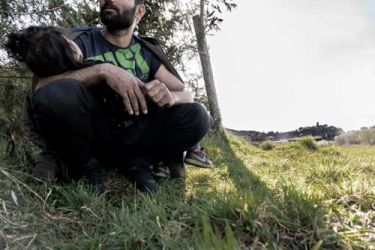
Listen to this story:
Nearly every day for the past three months, Ahmed, a 27-year-old father from Afghanistan, has risen at 6am in Velika Kladuša, a small Bosnian border town. After a walk of 30 minutes, Ahmed reaches the border and crosses into the European Union through the forest. By 7 or 8am, he is standing on a main road a few kilometres inside Croatia, waiting to be found by the police. Before lunchtime, he has been caught, beaten, and pushed back into Bosnia.
Keep reading
list of 4 itemsWho are the Afghan women negotiating peace with the Taliban?
The UK’s newest front-line workers: Afghan fruit sellers
A European odyssey: A portrait of Europe during the pandemic
“All I want is to see my son,” he says.
Ahmed, who did not wish to give his surname for fear of reprisals, estimates he has repeated this Sisyphean routine more than 60 times, varying his route yet sometimes encountering the same police officers, and never achieving his goal. Why does he do this? Because in a Zagreb refugee camp, just 90km (56miles) away as the crow flies but a world away to Ahmed, are his wife and infant son.
Family separations are common on refugee journeys and reunifications are difficult to resolve legally, as the Biden administration is finding on the US-Mexico border, where thousands of children remain separated from their parents as US policies on family reunification shift with the political winds.
In the Balkan states, reunification is all but impossible for many refugees. What makes the family dramas unfolding in northwest Bosnia so poignant is their relentless futility.
Ahmed is one of about a dozen fathers, all of them from Afghanistan, who remain stuck in northwestern Bosnia while their wives and children live in Porin, a family refugee camp in Zagreb.
‘Stay game’
Over the past months, refugee families trapped outside the EU in northwestern Bosnia have begun trying a new “game” – the word they use to describe an attempted border crossing. The “stay game” is born of growing desperation after dozens of failed crossings as Croatia ramps up patrols and employs increasingly violent methods to prevent refugees from reaching their destinations in Western Europe.
Most of these Afghan families arrived in the area last autumn and winter from camps in Greece, intending to push on to northern Europe. Many went “on game” with their families, crossing through the forest or across small rivers into southern Croatia, encountering police who dumped them back over the border into Bosnia – what is known as a “pushback”.
“Compared to previous months, significantly higher numbers of pushbacks have been reported by families and unaccompanied and separated children,” the Danish Refugee Council, a non-profit organisation operating in Bosnia, wrote in its most recent monthly report (PDF).
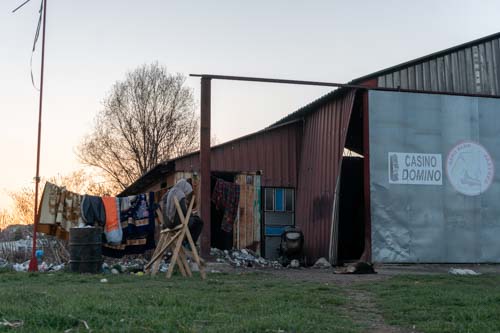
After months of failed attempts, families were exhausted. That was when the “stay game” began.
A “stay game” has two parts. First, the wives and children leave the fathers behind in Bosnia and cross into Croatia alone, where, due to their sex and age they judge they will be less likely to be pushed back. Once they register in the camp, they send the fathers a picture of their camp identification cards, proving they have asylum-seeker status in Croatia.
Then, the fathers attempt to follow. Travelling in small groups and carrying nothing more than a backpack of clothes and a print-out of the Croatian camp IDs, their marriage certificates, and sometimes a family photo, the fathers cross into Croatia – and attempt to “stay”. Every day, they wait in one of several spots just over the border, in the forest or clearly visible on the main road, where they know the police will find them.
Unlike most “games”, where asylum-seekers try to move undetected by authorities through several countries en route to their eventual destinations, these fathers want to be found. In some cases, they will even wave down Croatian villagers and ask them to call the police.
Once the authorities arrive, the fathers say they repeat the same line in English: “I am a refugee. My wife and children are in the Zagreb camp. Please take me to them.” In doing so, they hope that they will be lucky enough to find a kind-hearted officer who will help them.
These asylum-seekers are trying to “[make] their attempts to join their wives as legal as possible,” says Lisa Koerber, head of the border violence monitoring programme at No Name Kitchen, a non-profit organisation providing aid to refugees and migrants in the area.
However, unless their wives hold Croatian citizenship or some other “approved status” – not including being an asylum seeker – the Afghan fathers likely have little hope of a legal avenue for reunification, according to the Croatian Law Centre (CLC) in Zagreb, the law firm with which the United Nations refugee agency partners in Croatia. However, regardless of the issue of family reunification, these men are entitled, under EU law, to be considered for asylum in Croatia.
“The fact that these men are denied the right to seek asylum and instead expelled from the country is a breach of international law in its own right,” Koerber says.
The CLC operates in Croatia only and thus says it is “not in contact with migrants in Bosnia and Herzegovina”, but that has not stopped Ahmed from trying to reach them. He has sent scores of messages to the organisation’s Facebook account, explaining that his wife and son are in Zagreb, and punctuating his messages with crying-face emojis. His Facebook chat with the CLC shows none of his messages has even been read.
The UN refugee agency in Bosnia warns that “families should not risk dangerous onward movement”, a media officer says. “There is no guarantee that reunification will be possible and …the process is quite lengthy and can result in years of separation.”
Several fathers said they had considered bringing their families back to Bosnia so they could at least be together again, which refugees can legally do if they can prove they have a pending asylum claim in Bosnia. Many, however, consider this a step back in a journey that has already swallowed years of their lives. In particular, parents think of their children’s schooling and precious time wasted in overcrowded refugee camps with severely limited educational opportunities. The overwhelming consensus is that the only way forward is to keep pushing north.
The family is a closely-knit unit in Afghanistan, the men explain, but over the years, as they travelled across countries and time zones in cars, buses, boats and on foot, husbands and wives, parents and children have grown even closer and fathers’ roles as protectors have become more critical.
According to aid workers who have come across many men in this situation, for these Afghan men, fatherhood has become about something more than holding a steady job or organising repairs for the house. It is about protecting their wives and children in overcrowded refugee camps, carrying toddlers on their shoulders across mountains, learning how to quickly make a fire on a cold winter’s night when the whole family must sleep outside.
Now, overnight, these fathers are reduced to what they never thought they would be again: single men. The pain of such a cleaving, coupled with the humiliation that they can no longer provide for or protect their families, is almost too much to bear.
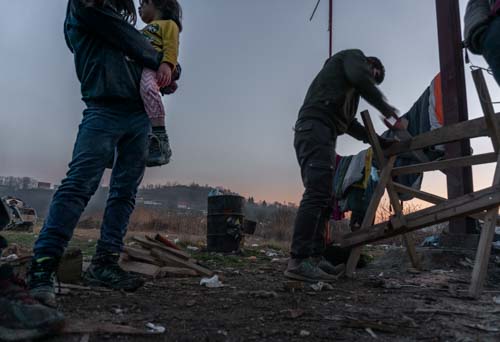
‘Now, I understand loneliness’
The only thing that keeps 39-year-old Mohammed going is the memory of his daughters’ laughter at his poor dancing skills. He has not seen his wife, Zahra, or his four daughters, 11, eight, and five-year-old twins, in two months now, although he has tried countless “stay games”.
Life is equally difficult for the children separated from their parents. Mohammed says his daughters ask every day over the phone why he hasn’t come to see them, and he is unable to answer them in a way they can understand.
“Children are resilient and have great capacity to recover and overcome stress, but they need support and to feel secure,” Dubravka Vranjanac, head of the Northwest Balkans emergency team for Save the Children, says.
The Afghan fathers know this. “The most important thing a father can do is to give courage to his family,” says Mohammed, who talks on video chat with his wife every day, squatting on a patch of grass beside the abandoned corrugated-metal building where he and other fathers spend their days. “I have to show myself to my wife,” he explains.
When Mohammed, who also did not wish to give his surname, is not calling his wife and daughters, he chats with the other marooned fathers, like Ahmed, who he says have become like his family. He also takes walks around Velika Kladuša, conversing with homeless Bosnians he meets. “I understand they are just like me: We are both alone. Now I understand their loneliness,” he says.
Mohammed goes on game nearly every day, as he knows it is likely the only way to see his family. “Remembering my wife and children gives me strength,” he remarks. “But when I walk near the border, it all turns to fear, and I begin to shake.”
In particular, Mohammed is afraid of the Croatian border police whose violent pushbacks against asylum-seekers have been well-documented by groups such as the Danish Refugee Council and No Name Kitchen, the latter of which is a member of the Border Violence Monitoring Network (BVMN), a watchdog organisation.
The Centre for Peace Studies, a Zagreb-based non-profit also part of BVMN, filed two criminal complaints last December on behalf of asylum-seekers who alleged they were detained by Croatian authorities and “brutally tortured”. One victim also says she was raped.
The Ministry of the Interior, which oversees Croatia’s police and border forces, did not respond to requests for comment for this article, but the office has previously denied any wrongdoing or excessive use of violence to the media. In recent media reports, the ministry has commented that: “The persistent portrayal of the Croatian police as a brutal and inhumane group prone to robberies and abuse of illegal migrants has now become commonplace without a single [piece of] evidence.”
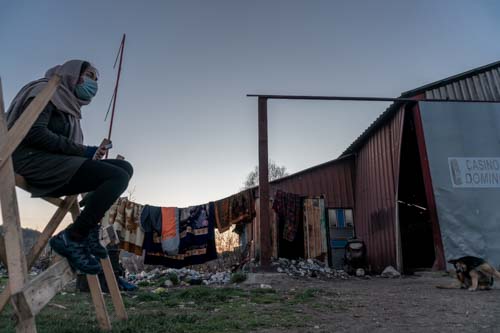
‘Don’t move or we will kill you’
One of Mohammed’s attempted border crossings – a few weeks ago – was one he says he “will never forget”. He, Ahmed and two other men crossed into Croatia through the forest, but instead of waiting for the police to find them, as they usually do, the men decided they would try to walk as far as they could in the direction of Zagreb, where they heard patrolling police units were kinder and less violent.
About 15km (nine miles) into Croatia, they came to a small river and after two of them had managed to cross by way of a fallen tree, a group of seven border officers emerged from behind the trees. One of them fired a gun into the air.
“Don’t move or we will kill you,” Mohammed heard the officer say, in English.
Six officers surrounded the men as the seventh, wearing a black balaclava and gloves, began beating them with a heavy baton made of white plastic, he says. One father showed the officer a picture of his wife’s camp ID card and pleaded, “Please, please don’t beat me,” Mohammed recalls.
Then it was Mohammed’s turn. “Lie down on the ground,” the officer told him.
“Do you have family?” he asked, and struck Mohammed before he could answer.
“Why did you come to Croatia?” he asked, and struck again.
“Why don’t you have a passport?” and struck again.
Then the men were taken in police vans to the border and pushed back into Bosnia, Mohammed says.
Mohammed was beaten black-and-blue on his hip, shoulder, arm and the back of his head, he says. His forearm was so swollen that he says he was unable to bring his hand to his mouth to eat for three days.
While Mohammed’s specific injuries could not be verified, a foreign paramedic who, until recently, was providing medical aid to refugees and migrants in northwest Bosnia wrote in a text message to Al Jazeera that he “had seen clear evidence of border violence among the migrant population, such as a clear imprint of a gun butt on people’s flanks and legs on a number of occasions, as well as broken ribs and shattered teeth”.
“I also heard accounts of heavy beatings at the hands of Croatian police from a range of people,” the paramedic wrote. He asked to remain anonymous due to difficulties he faces in assisting refugees and migrants in Bosnia. The State Ministry for Security of Bosnia has tightened regulations for aid workers and now requires all humanitarian aid to be coordinated via the Red Cross. As a result, some aid workers say they are finding it harder to go about their work as usual.
Each time Mohammed enters Croatia, his mind is filled with questions about his fate: “Which police will come? Which stick will they use to hit us with? Will it be wooden or plastic? Who will be the first to be hit? Where on our bodies will they hit us?”
The only way Mohammed can drive these fears away is to think of his wife.
“My first thought when I cross the border into Croatia is of my family. I remember that they are in Zagreb.”
The fathers cling to hopes of clemency. Each has heard stories of men who, eventually, somehow, made it through to their wives and children.
Mohammed recalls one time he began to cry when the police found him, and several officers softened. One of them took a picture of Mohammed on his phone and called his boss, asking if he could bring Mohammed to Zagreb. The boss said: “Deport him,” and the officer did as he was told.
“My boss decides about you and your family. Not me,” he told Mohammed.
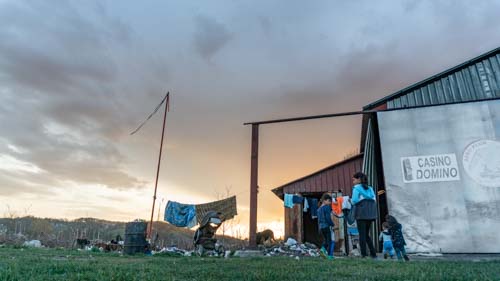
Another father, 30-year-old Mohammad Tajik whose wife and three-year-old daughter are in Porin, says that a successful “stay game” is based on nothing more than luck.
“Police don’t care if you have a marriage certificate,” he says. “If they call their boss and the boss says yes, then you go.” While the Croatian police has no obligation to assist with family reunification, the fathers hope that a sympathetic officer might take pity on them and try to help.
For the past two months, Mohammad Tajik has had no luck. His wife and daughter made it to Zagreb, travelling with two other women and their children. The other husbands managed to join their wives, but not Mohammad Tajik. Now, one family is in the Netherlands, and the other in Germany, all reunited.
“I think I have bad luck,” he says. “Everyone else managed to go.”
But some of the fathers are dealing with additional hardships beyond failed border crossings.
‘Why don’t you come here? You don’t love me or our children’
With a slim build and thin wire-framed glasses, Mohammed looks more like a literature professor than someone who used to work the fields. He fled his home in Afghanistan’s Bamyan province after facing persecution as an ethnic Hazara and settled in neighbouring Iran, where he worked as a farmer and married Zahra 13 years ago.
Mohammed left for Western Europe with his wife and two eldest daughters before the twins were born, and spent three-and-a-half years in Turkey, where his wife fell suddenly ill with a severe psychological condition that resulted in a year of hospitalisation.
“She beats her head on the wall,” he explains, slapping a wall to demonstrate. “Sometimes she finds a knife, a blade, a piece of glass…and I get scared.”
In March 2019, the family of six made it to the Greek island of Lesbos, and spent seven months in the Moria and Kara Tepe refugee camps before receiving a transfer to a camp in northern Greece due to Zahra’s fragile psychological state. The family waited nearly a year and a half in Greece for a decision on their asylum case, but finally decided to press on to northern Europe on foot. Mohammed says life in Greece’s overcrowded camps made his wife’s illness worse.
“130 years we’ve lived in Greece. Please let’s leave this country, please!” Mohammed recalls his wife saying before they made the decision to leave.
Now, in the Zagreb camp, Zahra is on medication again, but Mohammed worries constantly about her, explaining that her illness sometimes causes her to lose touch with reality.
“‘Why don’t you come here?’ my wife asks me. ‘You don’t love me, or our children. If you loved me you would be here.’ I tell her absolutely I’ll come. But my wife has psychological problems. She doubts me,” Mohammed says, shaking his head. He does not tell his family much about the violence he experiences in his efforts to reach them.
While the journeys of these fathers have varied greatly – coloured by differences in ethnicity, class, health and the trickiest variable of them all, luck – the men share the same motivation: They do not want their young children to grow up as they did.
Ahmed studied risk management at a university in Iran, only to be told he would not be able to finish his degree because he was a refugee without proper status. His son, 22-month-old Yousef, is deaf, and Ahmed knows educational options for him would be severely limited in Iran.
“My only wish is for my baby to live in Europe and for me to continue my studies,” Ahmed says. “But now we are here…We’ve fallen down and we can’t get back up again.”
“My time has passed,” Mohammed says. “Now the most important thing is that my daughters go to school.”
But Mohammed doesn’t believe in the dream of Europe as he once did. Although he has family in Germany, he is not sure he wants to join them there after reading news coverage of the Bosnia-Croatia border.
“Germany gave money to Bosnia to keep refugees in Bosnia and gave money to Croatia to beat refugees. All us refugees know this,” Mohammed exclaims.
“We are alive, but live like dead people,” he continues, his head hanging low. “We are men without emotions, without our families, without our wedding anniversaries and our children’s birthdays, without hope.”
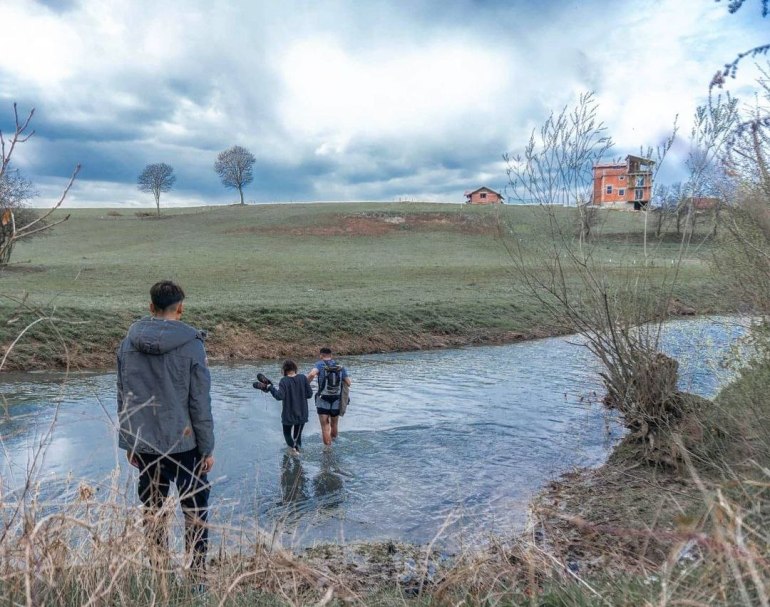
Not everyone here shares Mohammed’s despair. On a recent Friday afternoon, a 19-year-old Afghan woman began the “stay game”, walking through the forest on the Bosnian side of the border to a spot where the trees opened up to the Glina, a narrow, shallow river dotted with empty beer bottles and plastic. Just a few metres beyond lay Croatia.
“Her husband kissed her on the cheek,” says a photographer who witnessed her journey, “and told her where to go, to sit and wait for the police.”
The river was shallow, the water level below her knees as she waded across. On the other side, the woman walked up a gentle rise and sat in the grass under an overcast sky, yelling to the others that she could see a police car, down by the main border crossing in the Croatian town of Maljevac.
But it never came for her, so the teenager tried to walk the 90km (56 miles) to the family camp in Zagreb, a journey which would have taken about 18 hours if she had made it that far.
She was caught by police and returned to the Bosnian border that night, walking hours back to her husband in Velika Kladuša, through the night, by herself. She says she will try her luck again another day.